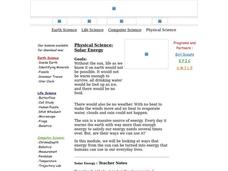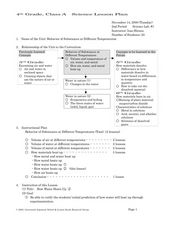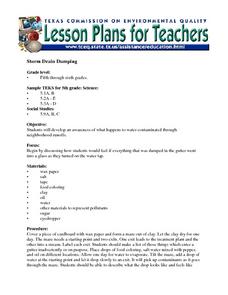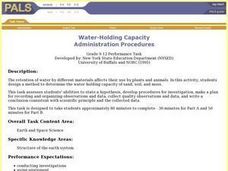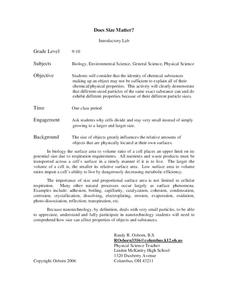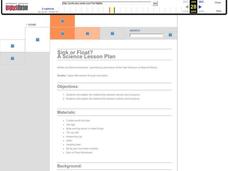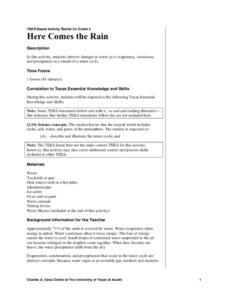Curated OER
Solar Energy
Young scholars investigate solar energy. They explore ways that energy from the sun can be turned into energy that humans can use in our everyday lives. In various experiments, they explore the effect of clouds and dust on photovoltaic...
Curated OER
Exploring Phases of Matter
Students discuss and experiment with the phases of water. For this phases of matter lesson, students recognize the different states of matter. Students measure and record changes and understand when the state changes.
Curated OER
Separation of Mixtures and Compounds For K Through 12
Learners explore mixtures and compounds. In this lesson, students do an experiment to distinguish between mixtures and compounds. Learners complete ten different phases of the experiment testing many different substances. Students will...
Curated OER
Water and Ice
Students examine water. For this chemistry lesson, student examine the physical properties of water and how it changes from a liquid to a solid or a gas. This lesson contains links to a second and third complimentary lesson on...
Curated OER
How Water Heats Up
Fourth graders conduct experiments heating water. In this inquiry-based early chemistry lesson plan, 4th graders use the materials given to experiment with the process of heating water. Students draw conclusions based upon their findings...
Curated OER
Three Clouds Activity
Students explore how clouds are produced through three different age-appropriate hands-on experiments.
Curated OER
Storm Drain Dumping
Students conduct an experiment to show how water gets contaminated through neighborhood runoffs.
Curated OER
Water-Holding Capacity
Students design and conduct an experiment to compare the water-holding capacity of sand, soil, and moss. They measure the change in weight for each material after adding the same amount of water to each material.
Curated OER
Behavior Of Substances At Different Temperatures
Fourth graders are involved in a lab experience to look at the concept of heating up various materials to see how they react to an increase in temperature. They make observations and record them in a lab journal. Then students discuss...
Curated OER
Activity #8 Simulation of Oil Spills
Students conduct an experiment to simulate an oil spill and identify the characteristics of oil in water. They evaluate the effectiveness of various cleanup methods. They discuss the how to clean up an oil spill, and what causes oil...
Curated OER
Does Size Matter?
Students explore the surface area to volume ratio in cellular respiration. While participating in an interactive lab experiment, they examine proportional surface area and discuss nanotechnology. Students observe the effectiveness of...
Curated OER
Air Pressure and Wind
Fifth graders study air pressure and learn how it can change the weather. In this air pressure lesson, 5th graders study the given diagrams and complete the experiments to learn how air pressure can change the weather. Students read...
Curated OER
Sink or Float?
Young scholars analyze the relationship between density, buoyancy, and salinity. In this chemical properties lesson, students read a background activity for the lesson and experiments to the topics. Young scholars discuss the questions...
Curated OER
Why is the Sea Salty?
Students conduct a hands-on activity to investigate salt concentrations in water and how salt remain after water evaporates. They can also do a Saltwater Painting to once again observe the evaporation. process.
Curated OER
Let it Grow and See What Happens
Middle schoolers participate in an experiment in which they try to stop algae from growing. In groups, they develop a hypothesis and test it while making changes to the experiment along the way. They make observations and organize...
Curated OER
The Mystery of the Sponge
First graders observe while water is absorbed into a sponge. They experiment by putting a sponge on yardstick and watch while water dries and the weight changes.
Curated OER
Global Water Cycle & Heat Flow
Students experiment to discover how different variables affect the water cycle. They do hat flow experiments and construct a computer heat flow model.
Curated OER
Set the Stage
Young scholars observe evaporation in a controlled environment. Evaporation is the change of liquid water into water vapor (a gas). The rate of evaporation is determined by many factors such as air temperature and humidity, liquid...
Curated OER
Water Cycle in a Bottle
Students study the water cycle. For this water science lesson, students complete a water cycle experiment using soda bottles.
Curated OER
Testing Weather Proverbs
Students study weather proverbs. In this weather lesson, students list weather proverbs and complete the worksheet to test the proverb. Students design an experiment to test the weather proverbs and conduct the experiments.
Curated OER
Here Comes the Rain
Second graders help to prepare a model of the water cycle before the conduction of this experiment. They use the model in order to observe changes that happen to water when it changes states of matter.
Curated OER
Understanding Salinity
Students discuss why the ocean is salty. They discuss what salinity is. Students are told that is they want to know how much salt is in a body or water, they would use a special scientific tool. They complete an Estuarine Layers science...
Curated OER
Water and Ice
Students explore the states of water. In this water states lesson, students observe ice over time and the changes that take place. Students read a related text and draw their observations in a journal entry. Students discuss the...
Curated OER
The Water Cycle: Transpiration
Students identify and describe the stages in the water cycle. Using plants, they determine if they play a role in the cycle and measure the water the plants give off. They complete an experiment to determine if deciduous or coniferous...


